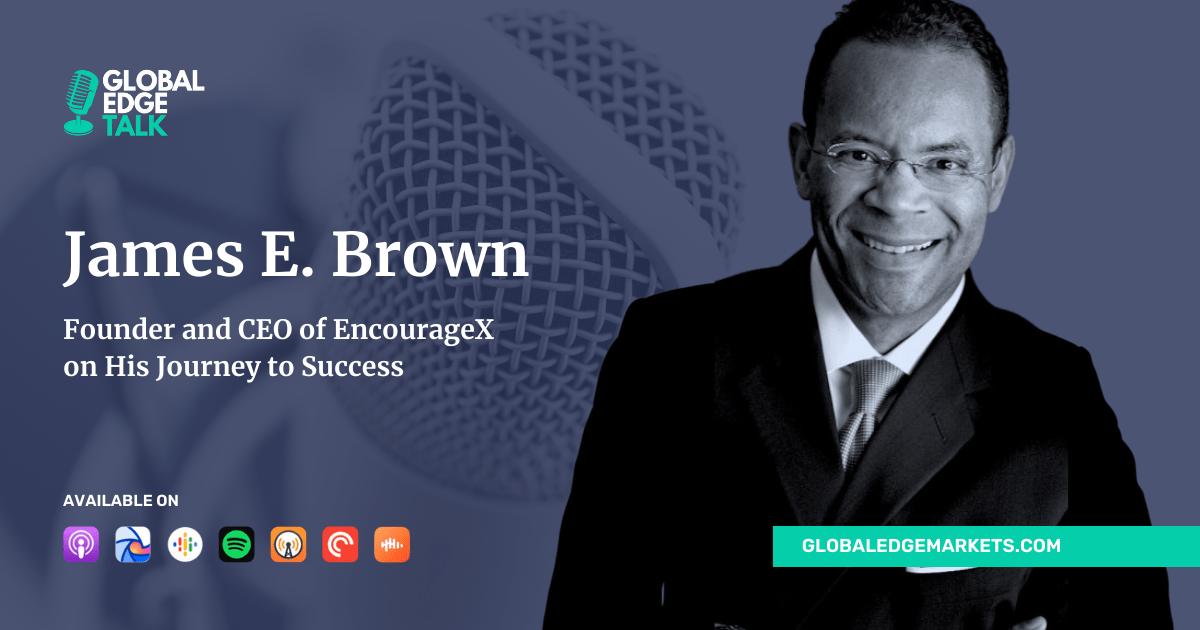Transcript:
Alex 00:00:17 – 00:00:26
Tuesday, July 18, 2023. Welcome to GlobalEdgeTalk. And my guest today is Katrina Clear. Hi, Katrina.
Katrina 00:00:26 – 00:00:28
Hi Alex, how are you?
Alex 00:00:28 – 00:01:05
Now we had Katrina on our program before. Katrina is a former executive in marketing, business development from Microsoft. She was also head of digital globally for Accenture and a number of other very interesting, very well-known firms. She has an amazing amount of experience in digital marketing and digital media, in technology. And it’s a pleasure to speak with Katrina today about the topic that we are all anxious about, which is artificial intelligence.
Alex 00:01:16 – 00:01:39
So Katrina, what can you say about the artificial intelligence in general first? I mean, we have a whole number of the entire number of questions, but you’ve been following it obviously like everybody else. How do you think it impacts the marketing discipline and chief marketing officers in general?
Katrina 00:01:40 – 00:03:22
Well, you know, I know there’s a lot of doomsdaying out there around AI right now, Alex. And, you know, I guess maybe that’s the fashionable thing for some people to write about. I think there’s more upside here than sometimes people are talking about. You know, when you think about all of the ways AI can help speed up some of the more manual processes in marketing and make it just easier for the team to do their jobs, right? The ways that it can help boost creativity in different kinds of things, whether you’re creating images, creating written content, other kinds of things, to again, just give them more tools to work better or more efficiently or just open up possibilities that may have been too time consuming or just not really available to them otherwise. And I think it’s exciting. You know, we kind of all lived through a lot of digital transformation and social media was a big part of that right over the last 10, 15 years. And at first everyone was like, oh, no, this is going to be, you know, no one was sure about it. Not everybody got on board with it. Right? And I think AI is the same kind of thing. I think people were a little nervous about it at first, but I think it opens up a lot of possibilities. You know, like anything, like back when social media took off, like you had to start hiring different people in your teams, right? The skills that you needed shifted and changed. And then that created a whole need to go into the analytics deeper and build robust analytics functions. And then that let you do more personalization that you couldn’t really do before. And so, you know, AI, I think, is just the next wave of that, really, at the end of the day. But it’s exciting, you know, cool stuff.
Alex 00:03:23 – 00:04:36
You know, I’m also excited about this. I mean, I think, I mean, obviously we’ve all used chat GPT and maybe, you know, Jasper and some of the other one, Google Bart, there’s so many of them now, generative AI tools and content creators and so forth. But, you know, it’s interesting to discuss. You and I are both members of the chief marketing officer community, both members of a newly refreshed the club CMO, if you will. And what’s interesting to discuss for, and I’m sure that a lot of our CMO peers would be agreeing with that, is you don’t necessarily have to know everything about AI, but if you surround yourself with smart people, capable people, experienced people, then you may put together a very good strategy. You may actually execute very well, you know, depending on what kind of company you are, whether you’re B2C or B2B. And so let’s talk about that. You know, who should be on the team? If you’re a CMO, who should be on your team in your stable, so to speak, in terms of the skillsets and in terms of capabilities?
Katrina 00:04:37 – 00:07:16
Yeah, and I think that’s the big question, right? You know, you and I have both been out talking to lots of people about this and, you know, one of the first few questions a CMO always is trying to grapple with is, you know, who do I need in the team? What technology do I need? And how fast can I get this done? Seems to be the big three questions. But you know, in terms of people on the team, and it’ll be interesting to see how these models unfold and you and I have talked about this, like when you think about the data scientists and data analysts that will really help power a lot of this, you know, with the people who know how to either leverage some of these large models that are out there or who know how to build them for the company that they’re at, you know, do those people sit in marketing? Do those people sit in some kind of central data or IT function because they maybe build some of these models for different parts of the company? You know, we’ll have to see how that goes. You could probably argue that they sit different places, but for the sake of argument, let’s just say they sit in the CMO’s organization because, you know, they might get there faster and be a little ahead of the game in some of this adoption. But I think it’s interesting, you know, if you get these data scientists and analysts and things that can come in and really understand the data models, even build them for you, like build your own, which could be really good, or maybe you can use more of a private version within one of the bigger models so your stuff doesn’t kind of get cluttered up, if you will, with some of everything else that’s in there. But if you just think about marketing as an example, let’s say you took all of your customer success stories that you were putting up on your website regularly and you sorted them by industry. So maybe you’ve got 10 of them in industry one, five of them in industry two, then eight of them in industry three. You could take all of the ones from industry one, right, load it up into your AI model, and then ask it to summarize the three key trends across all of those. You could do the same thing for industry second and the third industry. Then you could take all of them together and say, what are the most common trends that are crossing industries, right? And just think about how fast you could do that using AI versus how long it would take to do that without it, right? And that’s just getting more mileage out of content you already have, you know? So that’s, I think just those kind of, but you need the data scientists to help you set it all up the right way.
Alex 00:07:16 – 00:08:00
Absolutely. And you know, I think what you just said is brilliant in terms of a great example of how you can take a mountain of data, a mountain of content that a lot of our chief marketing officer peers have been collecting and leveraging and using. And all of a sudden you now have the ability to draw some conclusions, to leverage some of the old content that’s been sitting there collecting dust and could be refreshed potentially. And learn a lot from the content you already have, actually. Make it speak to you, make it talk, tell you stories and so forth.
Katrina 00:08:02 – 00:08:53
Well, yeah, I think those content strategists, because you and I talk a lot about that too, because that’s kind of the more fun part of marketing, right? It was like, how do you want to think about content and those kinds of things? You know, if those people could have a lens into trends of what are people talking about in the market now, right? They can monitor those trends, go harvest interesting things to say, again, out of content they already have. You know, again, faster, be part of the conversation in real time, see what works, see what doesn’t, you know, do your summaries and spill it over into a different part of a different AI tool that then says, build a 15 second video that brings to light these things and stuff. So that content strategist job, I think will get a lot more fun. I don’t know, what do you think?
Alex 00:08:54 – 00:09:50
I think so too. Another role on the marketing team that’s been getting a lot of attention is prompt scientist or prompt engineer. It’s kind of interesting because prompt engineering is when you go to Indeed.com and look at jobs in general, that pops up all the way to the top. So kind of interesting that when you look at the job description of the prompt engineer, you see a lot of content creation, you see a lot of analysis, you see a lot of interaction, interactive techniques, and so forth. What are your thoughts about that? How many potential new career paths AI can generate for the marketing discipline or for the marketing and technology discipline?
Katrina 00:09:51 – 00:11:31
I think this is a lot. The whole prompt engineer thing I think is fascinating. And again, not a perfect analogy, but if you hearken back to the earlier days of social media, and you would literally have people that sat there and monitored in real time what was going on on the social media channels that you cared most about. I mean, at the time it was probably Twitter and Facebook. When Instagram came along, it was probably that. And you had them do that so they could jump in and go create some real time conversations with whatever was swirling around out there. And that’s kind of like a prompt engineer, if you will. But it was just live in real time because it was like, let me see what I can put out there that’s gonna prompt someone to engage. Let me see what I can put out there as a prompt that’s gonna get someone to reply with some information that we wanna use for different things. And the AI version of it is kind of the next level of that, really, if you will. It’s a little bit more sophisticated and it takes some more thought and you really have to understand the structure of the model you’re quote unquote asking. But I think it’s a big burgeoning field. I think people who can do that well and have that level of critical thinking and specificity, I think they could do some pretty cool stuff. I think it would be a great job to really get your head in the game on what’s going on. I mean, that’s one of those people that if you find a really good one, you might wanna kind of just sit with them for a couple hours and see how they do it and see how it works. You probably learn a lot.
Alex 00:11:32 – 00:11:48
Fascinating. And again, we’re going back to the role of the CMO, right? That’s a very sensitive topic, very anxious topic for a lot of the chief marketing officers, chief digital officers, because they have to invest into so many skills and capabilities themselves. But…
Katrina 00:11:33 – 00:11:34
And I, you know, again.
Alex 00:11:49 – 00:12:10
The answer could be, look, I understand all of this. I have some experience with that, but most importantly, for a mid-sized to large-sized organization, I know how to put the team together and how to orchestrate the skillset, how to orchestrate the capabilities. What else? What else should be on the team?
Katrina 00:12:12 – 00:13:25
You know, I think when you’re thinking about the CMO in particular, you know, that continuation of the data literacy side of it all, right? Because this is a whole nother realm of data literacy now that you’ve got AI in the mix. And I think that’s really important to be able to explain why they picked different models or built different models and why they were using them certain ways. You know, and I think CMOs should be able to do that. I mean, it’s like explaining your media strategy to someone, like how did you pick this versus that and why are you targeting here versus there? And I think everyone who’s lived through and done a fair amount of digital transformation in their marketing teams over the last several years, and maybe they thought they’d be able to catch their breath and take a break for a little bit, and I don’t think that’s going to happen now. But I think that data literacy part is big in the technology adoption as well. You know, and again, I think a lot of CMOs have gotten better at that because everyone’s had to evolve their tech stack pretty continuously. I mean, it’s almost like you’re never really done. You add, you subtract, something changes to your company, you move it around, and it’s just there’s a lot in there. So this is another piece, I think.
Alex 00:13:26 – 00:14:52
In total agreement and kind of interesting, we already went through the data science and data topic a couple of years ago, maybe two or three years ago, even before COVID. And now it’s coming back together with content under the umbrella of artificial intelligence, under the umbrella of prompt engineering. Another thing that’s really important, after all of these disasters, COVID, now we’re facing the threat of war in Europe, recession and so forth and so on. A lot of the skill set is now weighing back into change management, crisis management, team management, with only team members being remotely located or hybrid located and so forth. So what do you think is going to happen with the merger of new tech, artificial intelligence, all the pressures? Of course, we have fractional going on right now. A lot of folks are going fractional because of hybrid, because of post-COVID type of phenomena, because a lot of the C-level folks are looking at potential cost savings and fractionalization of the responsibilities and so forth. What do you think is going to happen next?
Katrina 00:14:54 – 00:17:51
You know, I wish I had a crystal ball and I could say for sure, but I do think you’ve hit on the few themes that are going to be with us for a long time. And change management is one of them, and I think change management, particularly because of the events that you mentioned, you know, you have the pandemic, you’ve got, you know, the war in Ukraine, you’ve got other things going on around the world. And so there’s, you’re always in a state of change management is a CMO anymore, whether it’s political or social unrest or trends or issues, good or bad, wherever you happen to do business, whether it’s things going on inside your company, there’s a merger and acquisition, there’s other kinds of things that go on. So I think CMOs kind of went to bootcamp on change management over the last five years and, you know, developed some really good skills, but I think they’re going to need it. I mean, change management is a day to day thing anymore, you know, as well as that whole leadership and communications side of things, you know, I think CMOs have the opportunity to lead by example in a new world order. If you’re a CMO, you’ve got an incredibly diverse set of skills and people in your team. You know, let’s say your data scientists and everybody else are in there along with your analytics people. So you’ve got people who, you know, they speak numbers and data and trends, and that’s what they do in technology, you know, with your MarTech folks and sales tech folks. And then you’ve got kind of the people in the middle, like your messaging people, the words people that can, you know, bring things to light through language and different languages and multiple languages and all those kinds of things. Then you’ve got your true kind of visual creative people who design logos and graphics and imagery and infographics and all kinds of other things that bring, you know, a visual impact to everything that you do. And those are really different kinds of people in terms of how they work and how they connect. And as a CMO, you gotta have them all, you know, aligned and working as an integrated team with different kinds of personalities that probably don’t necessarily gel incredibly well just randomly talking to each other. So you really have to find some ways to bring them together around some common purposes, some common objectives, being able to break down the different things that you do so that the metrics around it for how people say we’ve done a good job or not, have not done a good job is spread out across those. I think it’s gonna be a challenge, but I think CMOs have kind of tiptoed into that area with the data and analytics and digital space again over the last few years. And so I think they can get there. And I, you know, honestly, I think they have an opportunity to be a leader in the executive team in terms of doing that well.
Alex 00:17:53 – 00:18:56
What is your opinion on the fact that the C-suite, the CEOs themselves, are struggling with recognizing this value, struggling with recognizing the value that the chief marketing officers would bring to the table, trying to integrate all these different skill sets, there’s different very diverse resources, geographically dispersed, randomly working in hybrid mode or face-to-face mode or completely remote mode and so forth, undergoing so many changes and so forth and so on. Why do you think the trend is towards the value that’s not being recognized by the C-level suite instead of appreciating this set of skills and the level of orchestration that the CEOs can possess?
Katrina 00:18:58 – 00:21:45
Yeah, I wish, I think we all wish we knew the answer to that. It’s my gut feel is that across the executive team, you know, the CMO is probably the role that it has to by definition and nature of the work, be one, the most proactive in terms of what they do. Cause you gotta get out in front of the marketplace and where you’re gonna go. So you have to be strategic to understand that, proactive to get it done and incredibly resilient to get things over the finish line because nothing ever goes exactly as planned. But in the world of marketing, when you’re dealing with humanity at large, a lot of things can go in different directions that nobody saw coming. And so I think CMOs are probably, not that I’m a little biased cause I am one, but maybe, you know, they’re probably the most resilient person on the executive team, again, out of necessity, but they’re often so busy being resilient and getting everything done with a hundred balls in the air and not one dropping and keeping things moving forward that I don’t necessarily think they have developed the constructs to help people who are their peers that are in much more structured kinds of functions that they have a lot going on. I’m not just not to say that they don’t, but they don’t change as fast. The function doesn’t change as fast as marketing does. You know, if you’re the CFO, the P&L statement kind of is what it is. I mean, there’s a lot of strategy going into how you manage cash and working capital and different things that you do. But at the end of the day, the rules of finance and accounting are very well understood and they do evolve, but much more slowly and for good reason, right? You know, if they changed every day, it would cause chaos inside a company. So, you know, I think that’s part of it is just being able to create the constructs of explanation for the business value marketing delivers. And there’s probably a different podcast. You and I have talked about that a few times too. But having that construct that you can’t explain as a CMO, the value marketing brings from a business value standpoint to the rest of the executive team, to your board, to your investors, because they certainly do, but I think it’s a busy job. And not that the other ones aren’t. I mean, the head of product or the CFO or the CHR or any of those people, but marketing is, it never sleeps. It doesn’t stop. It doesn’t matter if your business is local, regional or global, it doesn’t ever stop. And so you’re kind of always on in that job. I don’t know if I answered your question in there. I think you did. I just put it on a rabbit hole on this one.
Alex 00:21:42 – 00:22:37
I think you did. I threw down a rabbit hole on this one. No, absolutely. I think you did. And I think a lot of our peers who will be listening will absolutely agree with that because, and on top of it, you have to have a high level of emotional intelligence and understand everybody and understand the client and understand the strategy and develop a strategy and so forth and so on. So it is a very, very responsible and very complex entity. And it’s not, as we can see with AI and so forth and so on, it’s not getting any easier. Yet to conclude, if you surround yourself with some great skills, we’ve defined those skills. If you surround yourself with some great strategies in terms of how to manage crises, how to manage change and get in touch with your very diverse audience, I think you have a good shot at being very successful.
Katrina 00:22:38 – 00:24:33
Oh, absolutely. And it sounds trite because everybody says it, but everybody says it because it’s true. It all comes down to the team. And you’re only as good as a team that you’ve put together and you have to continue to evolve that team. And maybe that evolution is bringing in outside consultants or advisors to help fill gaps or help you get further faster on your AI strategy as an example. Or maybe it’s adding different roles into the team itself full-time. I think one of the nice things about being a CMO is I feel like you have a lot of flexibility in how you do those things. Budget aside, because that’s always a little bit of a gaining factor, but you can go out and pick up the phone and call peers in the community like you, me, Alex, and say, hey, have you tried this? Like, how did it go? Do you know anyone that’s doing this well? I wanna talk to some people. And CMOs are always very gracious, I feel like in terms of sharing the wealth there. But also, you can be like, hey, Alex, or hey, Katrina, I need somebody that can come in and I just need someone who can look at what we’re doing and say, here’s the most effective places for you to layer in some AI-related capabilities. It’s gonna help you get to your goals faster and it’s gonna really set you up for success, not just right now, but longer term, and here’s how you would evolve that. The good news is there’s people you can call to help you with that now and bring them in project-based, fractional-based, or full-time and help you get there. And I think that’s really exciting for CMOs because you don’t have to figure it all out by yourself. You need to figure out the strategy, you need to have the team organized. And like you said, team management is key, the communications around it, and be just really resourceful in terms of who you bring in for things.
Alex 00:24:34 – 00:25:16
Katrina, thank you so much for being a guest on Global Edge Talk. We will continue this conversation. Next time we may talk about M&A and private equity and how marketing folks can interact with investors and private equity organizations. We may also pick some of the thematic type of topics. CMOs meet startups, innovation. How do CMOs cultivate innovation inside of the organizations? That it becomes part of the culture and so forth. And so many other topics. So thank you for being in our studio and looking forward to talking to you again.
Katrina 00:25:17 – 00:25:21
My pleasure, Alex. Thank you for having me. I’m happy to come back anytime.






